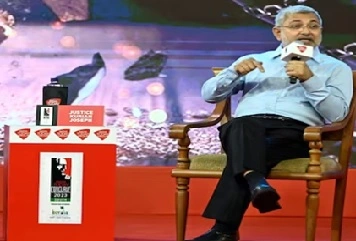Former Supreme Court judge Justice Kurian Joseph expressed his strong opposition to the concept of same-sex marriage. He emphasized that a relationship between two individuals of the same sex could, at most, be considered an association, but it should not be regarded as a form of marriage.
Justice Joseph, along with another retired Supreme Court judge, Justice Jasti Chelameswar, delivered a speech at the India Today Conclave South 2023.
When questioned about his stance on whether the Supreme Court should have addressed the same-sex marriage case, Justice Joseph unequivocally stated, “I am completely opposed to same-sex marriage,” expressing his strong disapproval.
Justice Joseph expressed his views by stating, “Marriage is a union between a man and a woman. Other relationships can be considered as associations. However, marriage serves the purposes of procreation and recreation. The other relationships, while they may be associations or unions, are distinct. I am completely against same-sex marriage, as it pertains to the concept of marriage itself. Homosexual relationships can exist as associations or personal choices, such as living together as friends or intimate friends. But when we talk about the institution of marriage, it holds a different significance. Marriage is the fundamental unit of society, and any alteration to it impacts the foundation of the issue.”
Justice Joseph emphasized that marriage is not a fundamental right. Regarding the jurisdictional aspect of the Supreme Court hearing the matter, he clarified that while the Court has the jurisdiction to address the issue, its primary role is to assess the legality of legislation and executive actions, ensuring their compliance with the Constitution.
He stated, “The court’s primary duty is to check the legality of legislation or laws in place. Without that, it is difficult for the court to intervene in this domain.”
Currently, there is no specific law either prohibiting or recognizing same-sex marriage in India. Consequently, the Supreme Court’s involvement in the recognition of same-sex marriage has faced criticism, as it is seen by many as encroaching upon the legislative domain.
Justice Chelameswar elaborated on the concept of the “lakshman rekha,” noting that it is often perceived differently by those in power and those not in power. He cited the SR Bommai case, where those who were not in power praised the Supreme Court’s judgment, highlighting the rhetoric surrounding the “lakshman rekha.” Justice Chelameswar emphasized that the true lakshman rekha is defined by the Constitution itself, which allocates specific functions to each organ of the state.
Furthermore, Justice Chelameswar stressed that pending appeals filed by convicts should be given top priority, as they involve personal freedom and liberty.
On May 15, a Constitution Bench of the Supreme Court, headed by Chief Justice DY Chandrachud, reserved its verdict on a batch of petitions seeking legal recognition of same-sex marriages.

